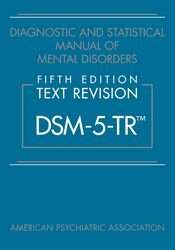APA releases fully revised reference manual of mental disorders

Today, the American Psychiatric Association (APA) released the “Diagnostic And Statistical Manual of Mental Disorders, Fifth Edition, Text Revision (DSM-5-TR)”. The manual, which the APA has published and updated since 1952, defines and classifies mental disorders in order to improve diagnosis, treatment and research.
Developed with the help of more than 200 subject matter experts, DSM-5-TR includes the fully revised text and references of the DSM-5, as well as updated diagnostic criteria and ICD-10-CM insurance codes. It features a new disorder, prolonged grief disorder, as well as codes for suicidal behavior and non-suicidal self-injury.
As the revision was prepared, 29 U.S.-based and international experts in cultural psychiatry, psychology, and anthropology reviewed it for cultural influences on disorder characteristics, incorporating relevant information in the sections on culture-related diagnostic issues. An additional workgroup composed of 14 mental health practitioners from diverse ethnic and racialized backgrounds with expertise in disparity-reduction practices reviewed references to race, ethnicity, and related concepts throughout the manual to avoid perpetuating stereotypes or including discriminatory clinical information.
“This text revision reflects the most recent updates in the literature with the added lens of ethnocultural and racial constructs in diagnosis as well as sex and gender constructions,” said APA President Vivian Pender, M.D. “It will be a powerful tool in the hands of psychiatrists and other mental health clinicians as we work to diagnose and treat our patients. In producing this volume, APA continues to advance the science of the mind.”
The DSM-5, since 2013, has been updated through an online process; researchers who wished to propose updates to the manual submitted them through the online portal. Each proposal underwent an extensive multi-stage review process by panels of experts before final approval and inclusion as appropriate. Ultimately, the DSM-5-TR includes all of these updates as well as technical fixes. The online process will remain open for DSM-5-TR as well.
Source: Read Full Article
